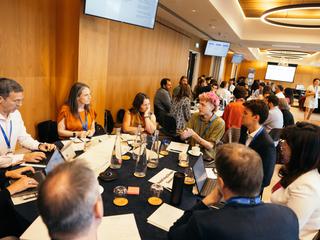We are tracking over 40 AI-powered tools in the climate space, and this is probably the tip of the iceberg. These tools are taking on tasks like identifying opportunities for emissions reductions, processing satellite data, preparing information for corporate disclosure or risk management. And tools specifically designed for the financial system are emerging, like Bloomberg’s own large language model (LLM), BloombergGPT.
How does this help us in the climate transition?
To move capital at scale into climate solutions, financial institutions need robust analysis on company transitions. Currently this analysis is available for just a few hundred companies, in part because this work is difficult and expensive. This is one area where AI and LLMs can help – augmenting human expertise by scraping and synthesizing data across many more companies and going deeper into supply chains, for example.
In partnership with Chatham House, we hosted a conversation this week to explore how we can harness these developments for climate goals. Here are some of the key issues identified:
- As we build this technology into our collective work, systems to enhance and maintain data integrity are key. LLMs rely heavily on the information they are fed, making the quality of disclosure crucial. Existing climate-related data has well-known issues, but LLMs add new challenges like hallucination.
- With so many organizations involved in relevant work, this could lead to transformation of the ecosystem of organizations involved in climate data. We’ll need to strike a balance between AI's capabilities and human expertise. The next generation of experts will learn their trade in new ways as a result of AI.
- Open-source models allow for collaboration, fine-tuning and bias correction, fostering trust and accountability. As a community, we’ll need to design openness into these systems. There is a potential tension here with the approach to regulating AI in some markets.
- There is no blueprint to follow and AI-driven tools will have many second and third order impacts on the climate transition – from new solutions to decarbonization challenges to the ground-truthing of existing analysis and even for asking new kinds of questions.
Click on the link below to watch the opening remarks by the panel. It does not include the Q&A which was held under Chatham House rules.
Where do we go from here?
This is an extremely fast-moving area and we’re all learning, but we can’t ignore these developments. Partnerships and coordination across the climate community, financial institutions and AI experts will be key in shaping a resilient and trustworthy climate finance data landscape. Follow us here to hear about future conversations and opportunities.
Huge thanks to Ana Yang and Bernice Lee at Chatham House for their partnership on this event and to Michal Nachmany, Matt Gray, Iain Clacher and Carl Miller for sharing their expertise on the panel.




